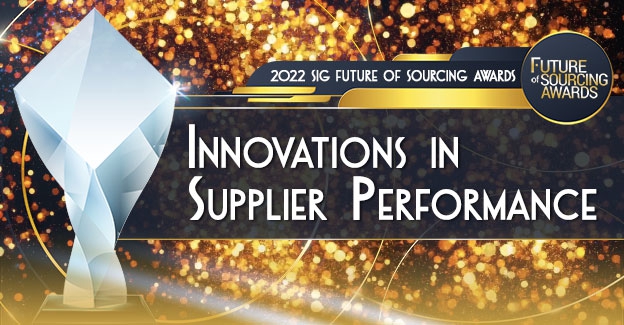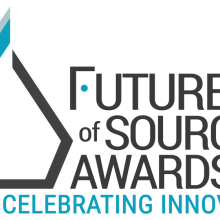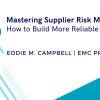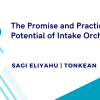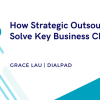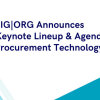This October, the Future of Sourcing Awards will celebrate organizations and individuals that have shown innovation, leadership and transformation in categories that are critical to the sourcing industry. Interviews with the finalists provide helpful insight about their projects, the problem they sought to solve and the impact to their organizations.
Can you outline why your team embarked on this project and the problem that needed to be solved?
How were things done originally and what was the inspiration to innovate the process?
- There was a lack of a comprehensive contract lifecycle management tool; contract registry was managed in a complex and cumbersome SharePoint workflow.
- The existing supplier compliance provider imposed high user-registration fees, resulting in low adoption and compliance rates by suppliers. Supplier setup process was manual and did not integrate with BGIS’s ERP.
- Recurring contract PO processes were inefficient, inconsistent, and fraught with error, resulting in invoice rejections and payment delays.
- The supplier invoice processing system was inefficient. Administration was labour-intensive, often resulting in payment delays.
BGIS is committed to implementing innovative ways to optimize our processes, making them more efficient and able to sustain the organization’s growth. As we indicated earlier, we partner with 12,000+ suppliers globally to provide reliable, quality services to our clients and we needed industry-leading systems and tools to make it easier for them to do business with BGIS.
What KPIs did you use to measure success for this project? (For example: performance, customer satisfaction, revenue, sales or relevant financial gains?)
- The eHUB contract lifecycle management system, the only one of its kind in our industry, allowed Strategic Sourcing to be more efficient and take on additional workload equivalent to 8% of our operating budget with no additional resources. eHUB currently manages 2,600+ contracts, 3,350+ amendments and 3,750+ suppliers. In 2021, the Strategic Sourcing team executed over 800 contracts and amendments (95% increase from that in the previous SharePoint manual tool). Strategic Sourcing has maintained a 99% compliance with our Strategic Sourcing and contract management policies. The eHUB system has the added features of milestone tracking, automated reminders, extensive initiative tracking, resource planning and advanced reporting capability. We recently added the ability to track achieved savings, which when reporting is fully implemented, will create additional efficiencies. The system allows us to implement bulk updates to records and process large amounts of data through the backend. For example, we recently established and processed 1,200+ amendments for execution within a week – an achievement which would not have been possible before.
- Since the implementation of the Avetta supplier compliance system and the new supplier setup tool, supplier registration in Avetta has reached 100%. 1,000+ suppliers with 8,000+ connections are registered and BGIS achieved 85% compliance within 6 months of implementing the system. Additionally, Avetta has been able to accommodate enhanced H&SE requirements, client-specific COVID-19 requirements, diversity and inclusion questionnaires, automated document signoff and enhanced reporting. Supplier satisfaction with Avetta increased to 98% from 72% with the previous provider.
- The implementation of the Oracle Cloud system resulted in the unprecedented “PO Flip” and enhanced financial reporting, internal controls, and invoice management capabilities. Real-time invoice validation and reduced processing time improved the on-time payment metrics. With the visibility, timeliness and transparency provided to the suppliers, the enhanced process enabled the P2P team to deal with 50% less exceptions compared to 2 years prior, saving substantial time and costs, and enabling the team to focus on other process improvements. In addition, the Supplier Portal also better supports cash stability for both BGIS and our suppliers.
- Invoice payment and efficiency improvements have been reported consistently since the implementation of the Supplier Portal and the Oracle Cloud system. First-pass-yield on invoice processing achieved 90%, up from 60% (50% improvement) and Supplier Portal usage has increased to 40% of our suppliers, up from 15%. The cost per invoice has been reduced by 35%. The P2P is now able to focus on value-add initiatives rather than ongoing issue resolution. Supplier satisfaction with BGIS invoice processing systems has increased to 95% (up from 44%)!
- Part of the Oracle Cloud system, a business portal for BGIS users allowed for automated change requests leading to reduced touch points, fewer exceptions and inquiries, real-time invoice validation, and improved ability for on-time payment. The maintenance activities of the contract PO were greatly streamlined reducing errors and rework.
BGIS issues an annual Supplier Satisfaction survey and while our relationship with our suppliers has always been very positive, since these supply-chain sourcing to payment solution improvements were implemented, our results have significantly improved. Overall satisfaction increased to 96%, up from 78%; the satisfaction with BGIS systems, tools and apps has increased to 89%, up from 62%; and 89% of our suppliers find it easy to do business with BGIS, up from 64%. These results indicate that we are well on our way of achieving our goal of making it easier for suppliers to do business with us.
How do you plan to ensure that the new model remains relevant and adapts to the future needs of the market?
What advice do you have for those who may want to implement this innovative approach in their own organizations?
- A well-established business case, project charter and executive support are key to a successful system development and change.
- Open forums, focus groups and clear communication within the organization as well as to the supplier base helped us come up with innovative and unique solutions. These open lines of communication and idea exchanges were imperative to obtaining user perspective as well as buy-in and support. Involving these key participants resulted in an outcome that provided increased supplier satisfaction scores.
- Having a Centre of Expertise along with strategic points of contact (SPOCs) in the business units to help with cascading and championing the change management message across their teams and help with training users was a key factor.
- Having standardized and centralized processing within our corporate procurement-related functions (Strategic Sourcing, P2P, etc.) using consistent tools and processes across all our business units is critical to success and efficiency.
- Comprehensive and ongoing communication and training is imperative to the success of the implementation of a system with such significant magnitude and span across our supply-chain and cross-functional delivery systems.
What factors do you think are the most important to consider when innovating supplier performance?


